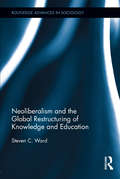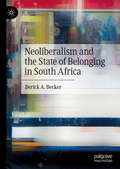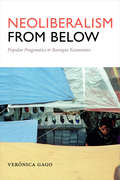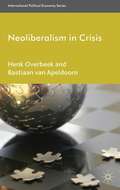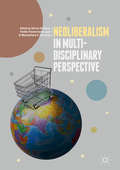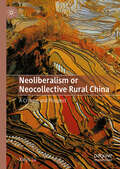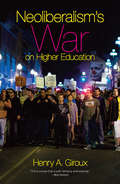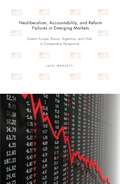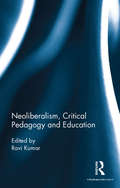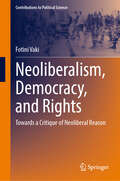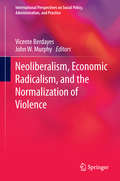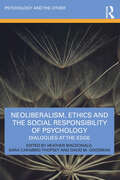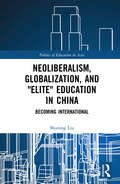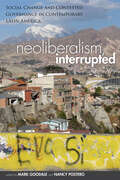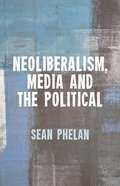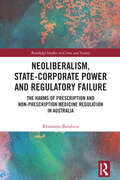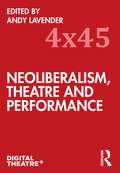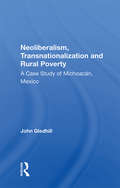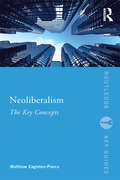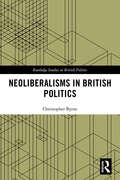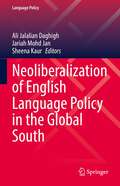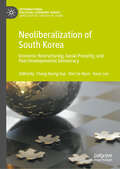- Table View
- List View
Neoliberalism and the Global Restructuring of Knowledge and Education (Routledge Advances in Sociology)
by Steven C. WardThis book examines the influence of neoliberal ideas and practices on the way knowledge has been conceptualized, produced, and disseminated over the last few decades at different levels of public education and in various national contexts around the world.
Neoliberalism and the Political Economy of Tourism
by Jan MosedaleTourism has become increasingly shaped by neoliberal policies, yet the consequences of this neoliberalisation are relatively under-explored. This book provides a wide-ranging inquiry into the particular manifestations of different variants of neoliberalism, highlighting its uneven geographical development and the changing dynamics of neoliberal policies in order to explain and evaluate the effects of neoliberal processes on tourism. Covering a variety of different aspects of neoliberalism and tourism, the chapters investigate how different types of tourism are used as part of more general neoliberalisation agendas, how neoliberalism differs according to the geographic context, the importance of discourse in shaping neoliberal practices and the different approaches of putting the neoliberal ideology into practice. Aiming to initiate debates about the connections between neoliberalism and tourism and advance further research avenues, this book makes a timely contribution which discusses the relationships between markets, nation-states and societies from a social science perspective. Neoliberalism is considered as a political-economic ideology, as variants of the global neoliberal project, as discourse and practices through which neoliberalism is enacted.
Neoliberalism and the State of Belonging in South Africa
by Derick A. BeckerThis book explains the making of the South African state and thereby contributes to the development theory by analyzing the concept of the embedded neoliberal state. The author offers a theoretical exploration of state formation as an inherently interconnected international and domestic social process as applied to the history and development of South Africa. A genuine social science that eschews disciplinary boundaries, this will appeal to a wide audience of scholars in the fields of political development, political science, African and development studies.
Neoliberalism as Exception: Mutations in Citizenship and Sovereignty
by Aihwa OngNeoliberalism is commonly viewed as an economic doctrine that seeks to limit the scope of government. Some consider it a form of predatory capitalism with adverse effects on the Global South. In this groundbreaking work, Aihwa Ong offers an alternative view of neoliberalism as an extraordinarily malleable technology of governing that is taken up in different ways by different regimes, be they authoritarian, democratic, or communist. Ong shows how East and Southeast Asian states are making exceptions to their usual practices of governing in order to position themselves to compete in the global economy. As she demonstrates, a variety of neoliberal strategies of governing are re-engineering political spaces and populations. Ong's ethnographic case studies illuminate experiments and developments such as China's creation of special market zones within its socialist economy; pro-capitalist Islam and women's rights in Malaysia; Singapore's repositioning as a hub of scientific expertise; and flexible labor and knowledge regimes that span the Pacific.Ong traces how these and other neoliberal exceptions to business as usual are reconfiguring relationships between governing and the governed, power and knowledge, and sovereignty and territoriality. She argues that an interactive mode of citizenship is emerging, one that organizes people--and distributes rights and benefits to them--according to their marketable skills rather than according to their membership within nation-states. Those whose knowledge and skills are not assigned significant market value--such as migrant women working as domestic maids in many Asian cities--are denied citizenship. Nevertheless, Ong suggests that as the seam between sovereignty and citizenship is pried apart, a new space is emerging for NGOs to advocate for the human rights of those excluded by neoliberal measures of human worthiness.
Neoliberalism from Below: Popular Pragmatics and Baroque Economies
by Verónica Gago Liz Mason-DeeseIn Neoliberalism from Below—first published in Argentina in 2014—Verónica Gago examines how Latin American neoliberalism is propelled not just from above by international finance, corporations, and government, but also by the activities of migrant workers, vendors, sweatshop workers, and other marginalized groups. Using the massive illegal market La Salada in Buenos Aires as a point of departure, Gago shows how alternative economic practices, such as the sale of counterfeit goods produced in illegal textile factories, resist neoliberalism while simultaneously succumbing to its models of exploitative labor and production. Gago demonstrates how La Salada's economic dynamics mirror those found throughout urban Latin America. In so doing, she provides a new theory of neoliberalism and a nuanced view of the tense mix of calculation and freedom, obedience and resistance, individualism and community, and legality and illegality that fuels the increasingly powerful popular economies of the global South's large cities.
Neoliberalism in Crisis
by Henk Overbeek Bastiaan Van ApeldoornThe authors interrogate the condition of the neoliberal project in the wake of the global crisis and neoliberalism's predicted death in 2007, both in terms of the regulatory structures of finance-led capitalism in Europe and North America, and the impact of new centres of capitalist power on global order.
Neoliberalism in Multi-Disciplinary Perspective
by Maximiliano E. Korstanje Adrian Scribano Freddy Timmermann LopezThis volume brings together well-versed authors from four continents to critically discuss the roots of neoliberalism and how academics use the word today. Neoliberalism has recently recycled and mutated towards new forms of radicalization where fear plays a leading role legitimating policies, which would otherwise be overtly neglected by citizens. The authors ignite a new discussion within social sciences, combining the advances of sociology, history, anthropology, communication and the theory of mobilities to understand the different faces and guises of neoliberalism.
Neoliberalism or Neocollective Rural China: A Critique and Prospect
by Xinyu LuThis book presents a groundbreaking critique of neo-liberal interpretations of global agricultural development, challenging dominant narratives with nuanced analyses rooted in historical and theoretical frameworks. It delves into diverse paths of agrarian transformation, from the "American Path" to the "Prussian Path," examining the complexities of state intervention, land ownership, and socio-political dynamics. Furthermore, it introduces an alternative vision for agricultural development: the construction of "Neo-collective Rural China." Through meticulous examination of case studies spanning China, Russia, and beyond, it unveils the intricacies of rural economies, migrant worker trends, and grassroots innovations. Emphasizing the need for inclusive policies and international collaboration, this work reimagines strategies for sustainable growth in the Global South, advocating for sovereignty, equity, and solidarity. A compelling synthesis of scholarship, it offers fresh insights into the multifaceted challenges facing contemporary agricultural development.
Neoliberalism's War on Higher Education
by Henry A. GirouxNeoliberalism's War on Higher Education reveals how neoliberal policies, practices, and modes of material and symbolic violence have radically reshaped the mission and practice of higher education, short-changing a generation of young people.Giroux exposes the corporate forces at play and charts a clear-minded and inspired course of action out of the shadows of market-driven education policy. Championing the youth around the globe who have dared to resist the bartering of their future, he calls upon public intellectuals-as well as all people concer ned about the future of democracy-to speak out and defend the university as a site of critical learning and democratic promise.
Neoliberalism's War on Higher Education
by Henry A. GirouxAn accessible examination of neoliberalism and its effects on higher education and America, by the author of American Nightmare.Neoliberalism&’s War on Higher Education reveals how neoliberal policies, practices, and modes of material and symbolic violence have radically reshaped the mission and practice of higher education, short-changing a generation of young people. Giroux exposes the corporate forces at play and charts a clear-minded and inspired course of action out of the shadows of market-driven education policy. Championing the youth around the globe who have dared to resist the bartering of their future, he calls upon public intellectuals—as well as all people concerned about the future of democracy—to speak out and defend the university as a site of critical learning and democratic promise.&“Giroux has focused his keen intellect on the hostile corporate takeover of higher education in North America . . . .He is relentless in his defense of a society that requires its citizenry to place its cultural, political, and economic institutions in context so they can be interrogated and held truly accountable. We are fortunate to have such a prolific writer and deep thinker to challenge us all.&”―Karen Lewis, President, Chicago Teachers Union &“No one has been better than . . . Giroux at analyzing the many ways in which neoliberalism . . . has damaged the American economy and undermined its democratic processes.&”―Bob Herbert, Distinguished Senior Fellow at Demos &“Giroux . . . dares us to reevaluate the significance of public pedagogy as integral to any viable notion of democratic participation and social responsibility. Anybody who is remotely interested in the plight of future generations must read this book.&”―Dr. Brad Evans, Director, Histories of Violence website
Neoliberalism, Accountability, and Reform Failures in Emerging Markets: Eastern Europe, Russia, Argentina, and Chile in Comparative Perspective (G - Reference, Information and Interdisciplinary Subjects)
by Luigi ManzettiThe agenda of neoliberal market reform known as the Washington Consensus, which was meant to turn around the economies of developing and postcommunist countries and provide the bedrock of economic success on which stable democracies could be built, has largely proved to be a failure, with Russia and many Latin American countries like Argentina left in severe economic crisis by the end of the 1990s. Some proponents of neoliberal reform, such as Anne Krueger, have attributed this failure to the piecemeal and incomplete implementation of reform measures, while others, including Nobel Prize economist and former World Bank vice president Joseph Stiglitz, have pointed to technical flaws in the policies. While both of these assessments focus narrowly on economic factors, Luigi Manzetti highlights the crucial importance of political institutions and processes to a fully adequate explanation. His argument is that the ideology of neoliberal reform, rooted in the theories of Friedrich von Hayek and Milton Friedman, assumed political checks and balances that did not exist in many of these countries undergoing market reform, and that only by taking political accountability as an influential variable in the equation for success can we really understand what happened. Where accountability was weak, patterns of corruption, collusion, and patronage worked to undermine the intended aims of market reform. Manzetti uses both large N statistical analyses and small N case studies (of Argentina, Chile, and Russia) to provide empirical evidence for his argument.
Neoliberalism, Critical Pedagogy and Education
by Ravi KumarThis volume examines the role of neoliberalism and its impact on education in South Asia. It contends that education is in a state of crisis across the world. This is reflected not only in the way the state has withdrawn to pave way for private capital but also in the manner in which knowledge and ways of understanding the world are being challenged by manipulation and adverse influences. A process of ‘factoryisation’ is underway as disciplining of human minds and redefinition of the purpose of human existence are being geared to fall in line with the needs of private capital. The book brings together incisive contributions from India, Sri Lanka, Pakistan and Nepal to explore newer possibilities to deal with the educational crisis, and looks at a range of critical themes in education: pedagogy, teacher–learner relationship, teacher education, the state of the university, and policy. Rich in content, critical and insightful, this book will be a valuable addition for scholars and researchers of education and education policy, sociology, public policy and South Asian Studies.
Neoliberalism, Democracy, and Rights: Towards a Critique of Neoliberal Reason (Contributions to Political Science)
by Fotini VakiThe book sheds light on the forms of neoliberalism’s political rationality by highlighting the theoretical foundations upon which they are built. It relies on Foucault’s account of neoliberal reason in terms of a governmental rationality encompassing all aspects of human life, as well as Critical Theory’s methodology. The book discloses the tensions and antinomies between the concepts neoliberalism resorts to for its own moral and theoretical justification and the historical forms of its realization. By combining the rigor of the normative principles of political philosophy with contemporary historical material, the book shows how neoliberalism realizes itself by negating liberty in its own name, undermining democracy, and annulling rights via their transformation into the morals of the new global market. The core argument permeating the book is that crises are the very condition of neoliberalism’s existence. It states that, paradoxically enough, neoliberalism is facing the crises it itself produces by touching off new ones.The book will appeal to students, scholars, and researchers of political science in general, and political theory, political philosophy, and political history in particular, interested in a better understanding of neoliberalism, democracy, and rights.
Neoliberalism, Economic Radicalism, and the Normalization of Violence
by John W. Murphy Vicente BerdayesThis compelling volume analyzes the wide-scale societal impact of neoliberal economic policy on contemporary life and behavior. Synthesizing perspectives from politics and economics with insights from psychology and linguistics, it argues that market-driven public institutions promote antisocial thinking, discourage critical reflection, and inure individuals to inequity and cruelty. Chapters cite the ubiquity of violence in modern society, from the marketing of the military to impersonal mass upheavals in the job market, as devaluing human worth and thus self-worth. But the editors also assert that these currents are not terminal, and the book concludes by identifying conditions potentially leading to a more civil and egalitarian future. Included in the coverage: The language of current economics: social theory, the market, and the disappearance of relationships. Neoliberalism and education: the disfiguration of students. Slicing up societies: commercial media and the destruction of social environments. Neoliberalism and the transformation of work. Economics, the network society, and the ontology of violence. A new economic order without violence. Given the centrality of economic events on the global stage, Neoliberalism, Economic Radicalism, and the Normalization of Violence stands out as both a springboard for discussion and a call to action, to be read by political and cultural economists, political scientists, and sociologists.
Neoliberalism, Ethics and the Social Responsibility of Psychology: Dialogues at the Edge (Psychology and the Other)
by Heather Macdonald David M. Goodman Sara Carabbio-ThopseyThis volume encompasses deeply critical dialogues that question how the field of psychology exists within and is shaped by the current neoliberal political context. Spanning from psychoanalysis to post-colonial theory, these far-reaching discussions consider how a greater ethical responsiveness to human experience and sociopolitical arrangements may reopen the borders of psychological discourse. With the understanding that psychology grows in the soil of neoliberal terrain and is a chief fertilizer for neoliberal expansion, the interviews in this book explore alternative possibilities for how this field of study might function. By offering their own unique responses regarding the current condition of their respective disciplines, these scholars critically consider the current conceptual frameworks that set the theoretical boundaries of psychology, and contemplate the ethical responsibility currently affecting the field. This book will prove essential for scholars and students across several disciplines including psychology, philosophy, ethics, and post-colonial and socio-cultural studies, as well as practising mental health professionals with an interest in the importance of psychological social theory.
Neoliberalism, Globalization, and "Elite" Education in China: Becoming International (Politics of Education in Asia)
by Shuning LiuThis book examines the practices and effects of emerging international curriculum programs established by Chinese elite public high schools and supported by China’s New Curriculum Reform and the Chinese-Foreign Cooperation in Running Schools (CFCRS) policy. Drawing on critical theory, the book applies sociological and anthropological approaches to the study of the educational practices of such curriculum programs and the rising Chinese elite class, as well as educational policy globally. Through analyzing a wide variety of data sources, this book focuses on examining how changing local and global contexts have influenced and shaped the educational opportunities, experiences, and aspirations of privileged urban Chinese students who are able to attend these programs and who hope to study at U.S. universities. In doing so, the book is intended to define the problematics of the internationalization of Chinese education and an emergent form of elite education in China, which are complex and embedded in the process of modernization in China. Neoliberalism, Globalization, and "Elite" Education in China: Becoming International will appeal to undergraduates, postgraduates, and academics in the fields of curriculum studies, educational policy studies, sociology of education, and anthropology of education, as well as policymakers with an interest in globalization and education, education policy, and education and international development.
Neoliberalism, Interrupted: Social Change and Contested Governance in Contemporary Latin America
by Mark Goodale Nancy PosteroIn the 1980s and 1990s, neoliberal forms of governance largely dominated Latin American political and social life. Neoliberalism, Interruptedexamines the recent and diverse proliferation of responses to neoliberalism's hegemony. In so doing, this vanguard collection of case studies undermines the conventional dichotomies used to understand transformation in this region, such as neoliberalism vs. socialism, right vs. left, indigenous vs. mestizo, and national vs. transnational. Deploying both ethnographic research and more synthetic reflections on meaning, consequence, and possibility, the essays focus on the ways in which a range of unresolved contradictions interconnect various projects for change and resistance to change in Latin America. Useful to students and scholars across disciplines, this groundbreaking volume reorients how sociopolitical change has been understood and practiced in Latin America. It also carries important lessons for other parts of the world with similar histories and structural conditions.
Neoliberalism, Media and the Political
by Sean PhelanNeoliberalism, Media and the Political examines the condition of media and journalism in neoliberal cultures. Emphasizing neoliberalism's status as a political ideology that is simultaneously hostile to politics, the book presents a critical theoretical argument supported by empirical illustrations from New Zealand, Ireland, the UK and the US.
Neoliberalism, State-Corporate Power and Regulatory Failure: The Harms of Prescription and Non-Prescription Medicine Regulation in Australia (Routledge Studies in Crime and Society)
by Rhiannon BandieraBased on over a decade of research, this book examines the social harms of Australian prescription and non-prescription medicine regulation and how these ultimately stem from neoliberalism and its reinforcement of state and corporate power.Neoliberalism shapes state and corporate power, regulation and the harms resulting from regulatory failure, yet the links between these themes are rarely discussed. Drawing on the concept of hegemonic neoliberal governmentality, this book critically examines Australian medicine regulation and the harms resulting from its failure in areas such as medicine quality, safety and efficacy; direct-to-consumer advertising; and marketing directed at health professionals. It traces these harms through the colonial foundations and evolution of medicine regulation in Australia, exploring both regulatory failure and the attempts at reforming this regulatory system. It argues that neoliberalism is not regulatable and reinforces and sustains itself, empowering the state and corporations while disempowering the public and those representing its interests. Thus, reducing its harms is only achievable through broader, transformative change, rather than by reforming (and thereby continuing to work within) the existing neoliberal capitalist system.Neoliberalism, State-Corporate Power and Regulatory Failure will be of value to practitioners, members of the public and private sector and academics active in the fields of state, corporate and state–corporate crime, social harm and regulation, as well as to those new to the study of medicine-related harms. It will also be of interest to all those concerned about their health and the medicines they use.
Neoliberalism, Theatre and Performance (4x45)
by Andy LavenderNeoliberalism, Theatre and Performance tackles one of the most slippery but significant topics in culture and politics. Neoliberalism is defined by the contributors as a political-economic system, and the ideas and assumptions (individualism, market forces and globalisation) that it promotes are consequently examined. Readers will gain an insight into how neoliberalism shapes contemporary theatre, dance and performance, and how festival programmers, directors and other artists have responded. Jen Harvie gives a broad overview of neoliberalism, before examining its implications for theatre and performance and specific works that confront its grip, including Churchill’s Serious Money and Prebble’s Enron. Liesbeth Groot Nibbelink conducts a fascinating discussion with Rainer Hofmann, artistic director of the SPRING Festival in Utrecht, on ways in which performance festivals can respond to neoliberal culture. Cristina Rosa explores contemporary dance in neoliberal Brazil as a site for both commodification and challenge. Sarah Woods and Andrew Simms discuss and present excerpts from their activist satire Neoliberalism: The Break-up Tour. Slim and elegant, forceful and wide-ranging, Neoliberalism, Theatre and Performance is an accessible resource for students, practitioners and scholars interested in how neoliberalism both suffuses and is resisted by today’s contemporary performance scene.
Neoliberalism, Transnationalization And Rural Poverty: A Case Study Of Michoacan, Mexico
by John GledhillCarlos Salinas's government drew praise from many academic commentators and foreign governments for its boldness in embarking on neoliberal economic reforms that tackled some of the shibboleths of the Mexican revolutionary tradition and for its supposedly astute political management of change. This book offers a more critical understanding of the e
Neoliberalism: The Key Concepts (Routledge Key Guides)
by Matthew Eagleton-PierceNeoliberalism: The Key Concepts provides a critical guide to a vocabulary that has become globally dominant over the past forty years. The language of neoliberalism both constructs and expresses a particular vision of economics, politics, and everyday life. Some find this vision to be appealing, but many others find the contents and implications of neoliberalism to be alarming. Despite the popularity of these concepts, they often remain confusing, the product of contested histories, meanings, and practices. In an accessible way, this interdisciplinary resource explores and dissects key terms such as: Capitalism Choice Competition Entrepreneurship Finance Flexibility Freedom Governance Market Reform Stakeholder State Complete with an introductory essay, cross-referencing, and an extensive bibliography, this book provides a unique and insightful introduction to the study of neoliberalism in all its forms and disguises.
Neoliberalisms in British Politics
by Christopher ByrneTaking a chronological approach, this book challenges established economistic and ideologistic narratives of neoliberalism in Britain by charting the gradual diffusion of an increasingly interventionist neoliberal governmental rationality in British politics since the late 1970s, and the various means by which the project has furnished itself with a hegemonic basis for its popular support. Spanning five decades of British political history and drawing on rich empirical evidence to bring conceptual clarity to, and chart the effects of, a style of government bound up with a host of epochal changes, it concludes by considering Brexit and the rise of Corbynism as the final act in the neoliberal saga. It then poses the question, Is British politics on the verge of a major reconstruction representing a decisive rejection of neoliberalism? This book will be of key interest to scholars and students of British politics and neoliberalism, liberalism and, more broadly to political theory, political economy and public policy.
Neoliberalization of English Language Policy in the Global South (Language Policy #29)
by Ali Jalalian Daghigh Jariah Mohd Jan Sheena KaurThis book investigates different ways in which neoliberal language and teaching policies have influenced the English language in global south countries across Asia, Africa and Latin America. Through the three main sub themes covered by the book, namely Neoliberalism and English Language Teaching Policies, Neoliberalism Ideology as in English Language Teaching Materials, and Experiences of Neoliberal Subjects, it investigates various aspects and means through which neoliberalism is realized in a variety of contexts.Through the first subtheme the volume covers the English language education policies of Chile, Bangladesh, India, and Morocco. The second sub theme concerns how different neoliberal values such as consumerism, entrepreneurship, and individualism are localized and constructed in the locally developed English language materials of Thailand, Taiwan, Malaysia, and Vietnam. The third sub theme includes studies on the impact of neoliberalization of English in relation to Colombian, Brazilian, and Pakistani stakeholders. This book is a valuable resource for academics, postgraduate students, researchers, policy makers, educators, and practitioners who are interested in neoliberalism in English language.
Neoliberalization of South Korea: Economic Restructuring, Social Precarity, and Post-Developmental Democracy (International Political Economy Series)
by Keun Lee Kyung-Sup Chang Se-Kyun KimNo doubt South Korea‘s neoliberalization has been closely influenced by the ideologies, policies, and experiences of the precedingly neoliberal West, but neoliberal shifts in the South Korean context have most critically conflated with the conditions and structures of its own distinctive developmental political economy and life world. Over nearly four decades of apparent neoliberal transitions, the country is now simultaneously neoliberal, developmental, neoliberally developmental, and developmentally neoliberal. Such complexities and contradictions are systematically analyzed in this transdisciplinary volume written by leading analysts of South Korea and beyond. They exhaustively cover the political, economic, social, and cultural dimensions of South Korea’s neoliberalization in conjunction with its earlier developmental order and latest all-front restructuring.
